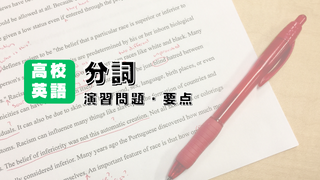【高校英語】分詞についてまとめています。分詞には、現在分詞と過去分詞があり。現在分詞は、進行形、過去分詞は、完了形や受動態でも使われます。ここでは、これらの分詞以外の用法をまとめています。
分詞のポイント
分詞の学習では、大きく「限定用法」「叙述用法」「重要表現」「分詞構文」「独立分詞構文」と5つに分けられます。それぞれを学べば、履修は完成です。
- 現在分詞…能動(特に進行)の意味「~する、~している」
- 過去分詞…おもに受動の意味「~されている、~された」
過去分詞といっても、「過去」でなく「受動」が中心であることに注意です。
限定用法
限定用法とは、分詞が形容詞のはたらき(名詞・補語になる)をして名詞を修飾する場合です。修飾とは限定するわけですから、これを限定用法といいます。通常、分詞が一語単独なら名詞の前に、語群をなしていれば名詞の後ろに置かれます。
<例文>
- We found the stolen bag in the bush.(私たちは盗まれたバックを茂みで見つけた)-1語単独で修飾–
- The man washing the car is Taro.(車を洗っているのは、太郎です。)-句で修飾–
叙述用法
<SVC>や<SVOC>のC(補語)の部分に分詞が来る用法が叙述用法となります。
- The child kept drying for hours.(その子供は、何時間も泣き続けた。)
- She sat surrounded by her children.(彼女は子供たちに囲まれて座った。)
分詞の重要表現
There is (are) +S+分詞:「Sが~している/されている」
進行形や受動態とほぼ同じ意味で用いる。
- There were three people waiting before me. (私の前に3人の人が待っていた) [=
- Three people were waiting. There is no water left in the bottle. (ビンに水は残って「残されていない) [= No water is left…]
go ~ing:「~しに行く」
- I went swimming in the lake with Hiroko.(私はヒロコと湖へ泳ぎにいった)
注意主に skiing, hiking, shopping など, 娯楽・スポーツを表す動詞が使われる。日本語では「湖へいった」というが, 英語では swimming in the lake (湖で泳ぐ)というつながりになり, to the lake とはしない。
「~するのに, ~して」の意味の現在分詞
- All of us were busy cleaning the room. (私達はみんな部屋を掃除するのに忙しかった)
- I had no difficulty breaking the lock. (錠を壊すのに困難はまったくなかった)
- Don’t spend so much time watching TV.(テレビを見てそんなに長時間過ごしてはいけない)
参考次のようにinを用いることもある。I had no difficulty in breaking the lock.
have (get) +0+過去分詞) (0は主に「物」)
「Oを~してもらう/させる」(使役) have(get)を強く発音)/ 「してもらう」か「させる」かは前後関係で判断。
- I hád my teeth examined at the dentist’s. (私は歯医者で歯を調べてもらった)
- He got his watch fixed. (彼は時計を直してもらった/直させた)
「Oを~される」(被害の受け身)
過去分詞を強く発音
- She had her bag snátched. (彼女はかばんをひったくられた)
- We got our roof blówn off in the storm.(私達は風で屋根を飛ばされた
参考 同じ「~される」でも,受動態との形の違いに注意
分詞の応用パターン
接続詞+分詞
分詞の意味を明確にするために接続詞をつける場合がある。
- While staying in Tokyo, I came to know her. (東京にいる間に、彼女を知った)
(= While I was staying.) - Though wounded, they continued to fight. (けがをしているのに,彼らは戦いつづけた)
(= Though they were Wounded.)
Being +形容詞/名詞)の Being の省略
(Being) Unable to speak English, I expressed it by gestures.(英語が話せなかったので,私はそれを身振りで表した)
with +A十分詞
Aが~している/されている状態で 独立分詞構文の前に with のついた形。
- She listened to the story with tears running down her face. (彼女は涙を流して(一涙が顔を流れ落ちる状態でその話を聞いた)
- He stood there with his eyes closed. (彼は目を閉じて[一目が閉じられた状態でそこに立っていた)
【問題】分詞の練習問題
意味が通る英文になるように( )に入る適語を番号で選べ。
(1)He seemed ( ) at the result of the match.
① to please ② pleasing ③ please ④ pleased
(2)Keep your eyes ( ) until I say OK.
① closed ② closing ③ close ④ to close
(3)My mother was happy to see her guest ( ) her cakes eagerly.
① eaten ② eats ③ to eat ④ eating
(4)Were you ( ) with the result?
① satisfying ② satisfied ③ satisfy ④ to satisfy
(5)He kept ( ) for the bus.
① waiting ② waited ③ was waiting ④ was waited
(6)I often heard him ( ) the piano.
① plays ② play ③ is playing ④ to play
(7)I was doing my job when I heard my name ( ).
① called ② calling ③ be called ④ call
(8)I saw my sister ( ) by her teacher.
① scold ② scolding ③ scolded ④ having scolded
(9)The teacher caught the student ( ) in class.
② sleep ② slept ③ sleeping ④ to sleep
(10)”Have you sent the manager’s letter?”
“No, not yet. I must have it ( ) first.”
② be signed ② his signature ③ sign ④ signed
【解答】分詞の練習問題
(1)④ He seemed pleased at the result of the match.(彼はその試合の結果に喜んでいるように見えた)
(2)① Keep your eyes closed until I say OK.(私がいいというまで目を閉じていて)
(3)④ My mother was happy to see her guest eating her cakes eagerly.(私の母は、お客さんが、彼女の作ったケーキを夢中で食べているのを見て喜んでいた)
(4)② Were you satisfied with the result?(あなたはその結果に満足しましたか)
(5)① He kept waiting for the bus. (彼はバスを待ち続けた)
(6)②
(7)①
(8)③
(9)③
(10)④
(6)は、知覚動詞と原形不定詞の関係

コメント